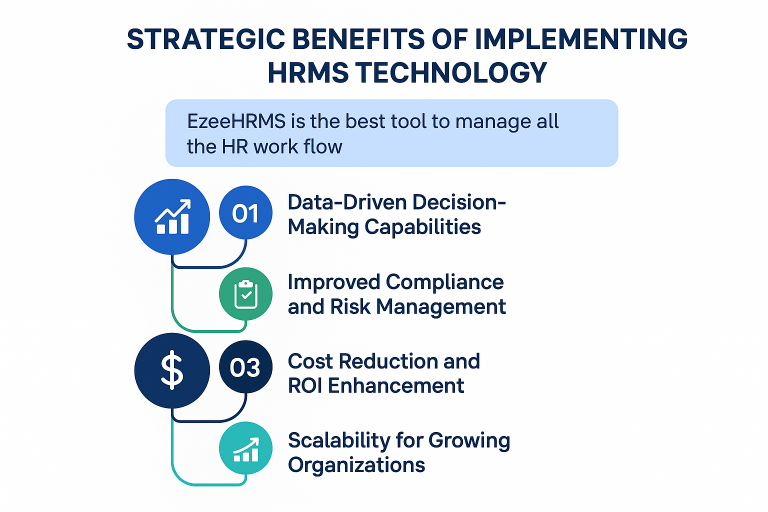Top HR Challenges Solved by Modern HRMS Tools in 2025
Resource departments in every industry face increasing pressures to reduce inefficiencies, increase employee satisfaction, and promote growth for their organizations. Managing HR functions manually has been ineffective enough that many organizations are moving away from these traditional processes and are using Technology to take on HR complexity with a comprehensive human resource management system (HRMS). These robust platforms solve essential pain points while transforming how organizations operate and engage their most valuable asset, their people.

Major HR Challenges Plaguing Modern Organizations
Administrative Tasks That Take Up Time
HR professionals are regularly inundated with paperwork – whether it’s completing leave forms, Welshing employee records and correspondence, and keeping everything straight can be horrendous. These administrative tasks that human resources personnel are responsible for are, in many cases, time-consuming and potentially cost hundreds of hours to complete each year
(e.g., if HR spends 3 hours weekly on employee record keeping, that means 156 hours a year or 4 weeks). These are also tasks that are subject to manual data entry, and that can lead to costly human error (such as tax compliance, processing of pays, and important documentation, etc.)
Complex Payroll Management Problems
Calculations of salaries become more complex, consequently, as more employees and employee classes, and other organizational policies and benefits (e.g., 401k plans) or questions of employment arise.
Employee Performance Tracking Problems
HR professionals assist managers and their departments in focusing their time and energy on managing their subordinates; however, they run into issues such as how to provide employees with feedback, create better work performance objectives, and identify employee scope for improvement (and it might not be broken down into workable performance management).
How Advanced HRMS Solutions Transform HR Operations
Streamlined Administrative Processes
Contemporary HRMS solutions can automate and streamline administrative tasks, reducing a potential 70% of manual workloads. HRMS platforms develop processes through the digitization of the employee onboarding process, centralization of employee databases, and employee self-service peer portals, including access to relevant employee data, requested leave, and other documents relevant to the employee. Automated workflows build standard processes and give HR teams more time to spend on strategic succession planning, organizational development, and employee development.
Automated Payroll and Compliance Management
Modern HRMS solutions redefine payroll processing due to tremendous automation. HRMS solutions are able to deduct annual salaries with relative accuracy; calculate complex salary and bonus structures; manage statutory deductions; and provide compliance reporting with next to no manual input. Real-time attendance systems integration ensures salary calculations, while tax engines within the HRMS solution can automatically update with a regulatory change without input from HRMS end-users.
Full-featured Performance Management System
Current solutions for HRMS now offer a robust and fully-featured performance management module that includes continuous feedback, goals, and skills assessment. Managers can now track employee progress on customizable dashboards, receive 360 reviews, and identify talent and high-potential. These tools have immense utility to enhance transparency, in which organizations can evaluate employee performance while giving an organization the entire view (data-driven) to make decisions on career development opportunities.
Enhanced Employee Engagement Features
Today’s solutions are increasingly offering employee engagement components such as pulse surveys, feedback, and recognition, allowing organizations to outline employees’ satisfaction, share feedback areas of employee improvements and apply potential assessments to enhance organizational culture. Employees at every level can quickly communicate when communication is integrated with a variety of communication tools, plus leaders can share ideas that are relevant organization-wide.
Strategic Benefits of Implementing HRMS Technology

- Data-Based Decision-Making Capabilities
HRMS platforms have analytics and reports that provide a wealth of information on labor trends, productivity trends, and organizational vitality. HR leaders can connect the dots between turnover risk, training impact, and decisions about equitable distribution of resources. Predictive analytics features allow organizations to predict their HR needs based on the current rates.
- Better Compliance and Risk Management
Automated HRMS systems make compliance manageable by providing an audit trail, reports on compliance, and forcing compliance with labor laws. Systems like these provide legal protection by lowering exposure and litigation risks. Records are generated to document for regulatory visits and internal audits.
- Reducing costs and increasing ROI
Companies that invest in HRMS solutions usually achieve a lot of cost savings with a reduction of administrative burden and mistakes. By taking away routine tasks, HR’s can spend time on value-add where they can have the biggest impact on organizational outcomes as well as employee satisfaction.
- Scalability for growing organizations
Modern HRMS solutions support growth without the need for supportive HR staff in proportion to growth. Cloud-based approaches provide trouble-free scalability while still delivering the same performance and functionality across varying sizes and structures.
Choosing the Right HRMS Solution for Your Organization
- Key Features to Think About
When you are looking at different HRMS solutions, ultimately you should look at options that supply both modules on payroll management, time and attendance management, performance management, employee self-service, and training management, if needed. You should have ease of use in the HRMS product, mobile app capability, and advanced reporting functionality to help your organization.
- Implementation and Integration Considerations
In order to successfully implement your HRMS, you need to plan your implementation, get consent from the stakeholders, and implement a training program to onboard staff. You will want to identify which HRMS solutions will integrate with your existing systems and provide higher-level support during transitional periods.
- Future-Proofing Your HR Technology
You need to choose the HRMS systems that continue to innovate and stay up to date regarding technology and compliance changes. You can choose cloud-based HRMS solutions that update automatically to keep your competitiveness and consistency with evolving business needs.
Transform Your HR Operations Today
The growth of HR technology has created exceptional avenues for organizations to fine-tune their human resource management processes. Today, HRMS solutions respond to fundamental challenges and offer strategic options that positively impact organizational outcomes.
Are you ready to transform your HR operations? BusinessEzee’s EzeeHRMS is the leading solution for organizations that require comprehensive, user-friendly, and scalable HR Management value. With a powerful, rich feature set, seamless integration options, and high-quality service processes, EzeeHRMS allows you to convert HR challenges into an advantage for the organization.
Contact BusinessEzee today to discuss how EzeeHRMS can improve your HR processes, employee satisfaction, and meet your organization’s growth goals.

